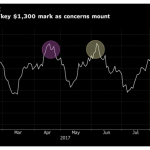Inflation is a measure of how much prices for a defined set of goods or services have increased over a period of time. If, during the same period, wages do not increase by the same margin then the purchasing power of those involved falls. Over many years, wage settlements in the UK have often been “below” inflation, meaning that standards of living have been eroded. Economists (we are told) are keen to avoid “wage inflation” where earnings rise as a result of a knock-on effect as one group of workers demands an increase in line with what other workers have received, but without a corresponding increase in output.
The news that UK wage increases have outstripped inflation by quite some margin will be welcomed in households all over the land. In the period between May and July this year, compared to the same period last year, average earnings increased by 2.9%. This is the fastest rate of wage growth seen in the UK since 2009.
UK inflation fell back from 0.1% in July to stand at 0% in August. The decline is probably due to the continuing low price for crude oil and gas which feeds through into energy and transportation costs. The declining level of inflation is likely to delay any increase in Bank of England interest rates a while longer.
Whilst the level of unemployment remained stable at 5.5% of the workforce, the numbers out of work (and claiming benefits) increased by 10000 to 1.82 million. However, the accuracy claimed for the figures is ± 76000, so the rise can’t really be seen above the background noise in the figure. The Office for National Statistics thinks that 31.09 million people are in work in the UK giving an employment rate of 73.5% of the UK population between the ages of 16 and 64 (an interesting figure because the school leaving age in the UK is now 18 for anybody born after 1997). This employment participation rate is the best on record.














Leave A Comment